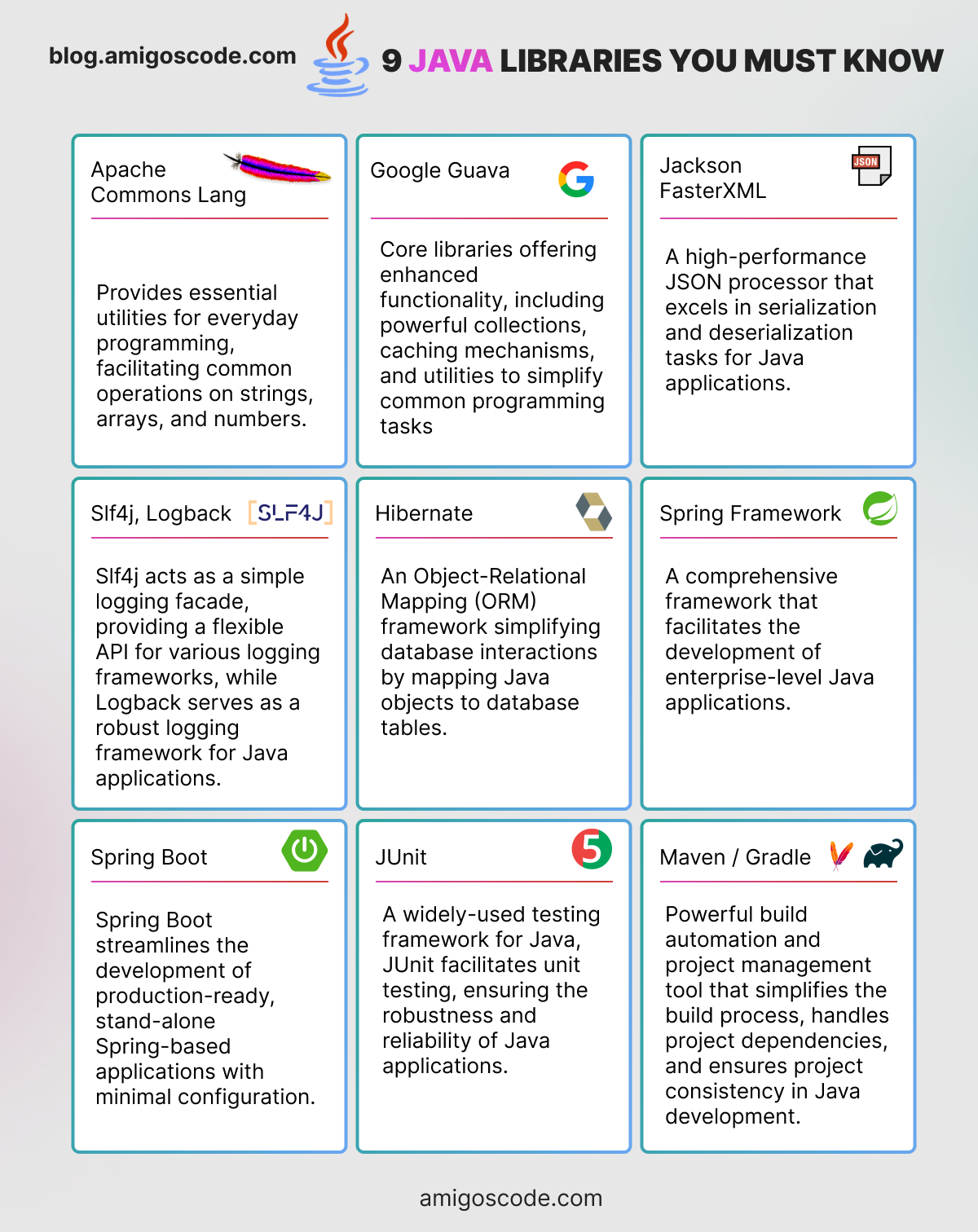9 Popular Java Libraries you must know
Java Developer's Arsenal: A Closer Look at 9 Critical Libraries
In this blog, we embark on a journey to explore and celebrate nine Java libraries that stand as pillars in the realm of software development. These carefully curated tools have become indispensable for developers, providing solutions to challenges and enhancing the overall coding experience.
Whether you're a seasoned Java veteran or just stepping into the vast landscape of programming, these libraries offer a wealth of functionality, streamlining your projects and opening new possibilities.
In no particular order
1. Apache Commons Lang
- Apache Commons Lang provides a robust set of utilities that go beyond the standard Java libraries, offering essential functions for everyday programming. It simplifies tasks involving strings, arrays, and numbers, making it a valuable addition to your Java toolkit.
2. Google Guava
- Google Guava's core libraries augment the capabilities of Java by providing advanced features such as powerful collections, caching mechanisms, and utilities that significantly streamline common programming tasks. It's designed to enhance code readability and maintainability.
3. Jackson
- Recognized for its exceptional performance, Jackson is a go-to library for JSON processing in Java applications. It excels in handling serialization and deserialization tasks, making it an essential choice for data interchange in modern Java development.
4. Slf4j with Logback
- Slf4j acts as a flexible logging facade, allowing developers to use various logging frameworks seamlessly. Paired with Logback, a robust logging framework, it provides a comprehensive logging solution for Java applications, ensuring effective monitoring and debugging.
5. Hibernate
- Hibernate, an Object-Relational Mapping (ORM) framework, simplifies database interactions by mapping Java objects to corresponding database tables. It abstracts away the complexities of SQL, providing a more object-oriented approach to data persistence.
6. Spring Framework
- The Spring Framework is a comprehensive and modular framework that facilitates the development of robust, scalable, and maintainable enterprise-level Java applications. It covers a wide range of features, including dependency injection, aspect-oriented programming, and transaction management.
7. Spring Boot
- Building on the strengths of the Spring Framework, Spring Boot takes simplicity to the next level by offering convention-over-configuration and a range of pre-built templates. It enables developers to quickly create production-ready, stand-alone Spring applications with minimal setup and configuration.
8. JUnit
- JUnit is a widely adopted testing framework in the Java ecosystem. It supports the development of reliable and maintainable code by providing a straightforward way to write and execute unit tests, ensuring the correctness of Java applications.
- Apache Camel is an open-source integration framework that simplifies the implementation of enterprise integration patterns. It provides a variety of pre-built components and connectors, making it easier to integrate different systems and communicate between diverse applications.
9. Maven
- Maven is a powerful build automation and project management tool that simplifies the entire build process. It manages project dependencies, facilitates the build lifecycle, and ensures project consistency, making it an indispensable tool for Java development projects of all sizes.
Free YT Java Course 😮
In case you missed Java Road Map
18 Most Used Java Keywords
▷ 🗓️ Next we will cover Monolithic VS Microservices Architecture
Happy coding ❤️




